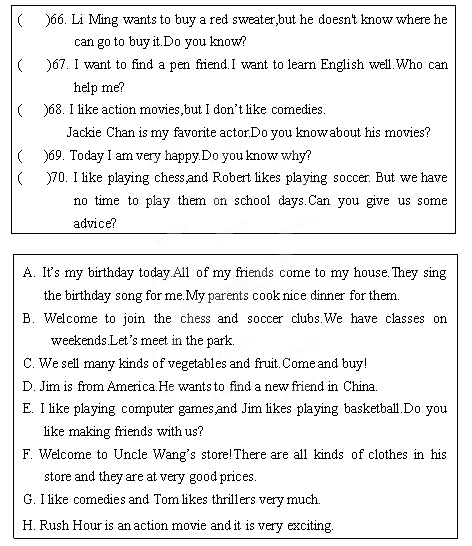题目内容

根据短文内容判断正(T)误(F) :
【小题1】Jack’s parents are English teachers.
【小题2】Mr. and Mrs. Brown are working in Grade 3 now.
【小题3】Jack is a student in a Chinese school.
【小题4】Jack likes to play with Chinese children.
【小题5】Jack learns the Chinese language (语言) by listening, speaking, reading and writing.
【小题1】T
【小题2】F
【小题3】T
【小题4】T
【小题5】T
解析试题分析:本文叙述了布朗先生和夫人来自美国,现在是中国的一所学校的老师,他们的儿子杰克也在中国,杰克正在学习汉语。
【小题1】根据They are now teaching English in Zhengzhou可知他们都是英语老师,故选T。
【小题2】根据Jack is in Grade Three in a Chinese school.短文中没有提到布朗的先生和夫人所教的年级,故选F。
【小题3】根据Jack is in Grade Three in a Chinese school.杰克是在中国的一所学校,故选T。
【小题4】根据He plays with Chinese children every day.杰克喜欢和中国的朋友一起玩,故选T。
【小题5】根据He listens to Chinese,speaks Chinese ,read books in Chinese and writes in Chinese.杰克通过听、说、读和写来学习汉语,故选T。
考点:日常生活类短文阅读。

 一线名师权威作业本系列答案
一线名师权威作业本系列答案 I live in a small town near Xing'an in Guilin. You can't see it on the map of China, because it is too small. The air here is fresh(清新的). There are not many tall buildings in our town. The tallest building is in our school. There are four hundred students and twenty-five teachers in our school. In the front of the school, there is a playground. I often play basketball with my classmates on it. There is a little garden behind our school. And we can grow (种植) beautiful flowers and plant trees there. Next to the garden, there is an orange orchard(果园). You can hear birds singing everywhere. There is a river not far from our school. In summer, we usually go swimming with our teachers in it. We study Chinese, English, Maths and other subjects at school. The teachers are very nice. We love our school.
【小题1】The writer lives .
| A.in a small town | B.in the city of Guilin | C.Xing'an | D.in a tall building |
| A.a river | B.an orange orchard | C.a playground | D.a garden |
| A.4025. | B.425. | C.245. | D.400. |
| A.There are many tall buildings in the town. |
| B.Behind the school there is a garden. |
| C.There is a river in the school. |
| D.People can hear students singing everywhere. |
| A.The Garden | B.A Small Town | C.Our School | D.The Best Building |
Some people think only school children do not agree with their parents, however, it is not true.
Communication is a problem for parents and children of all ages. If it’s hard for you to communicate with your parents, don’t worry about it. Here are some advice for you to bridge the generation gap (消除代沟).
Don’t argue (争辩) with your parents. Don’t get to your parents when you are angry. Your parents probably won’t consider your ideas if you are shouting at them. And you can’t express yourself well if you are angry. Go someplace to cool off. Make sure you understand why you are unhappy. Then think about what you want to say to your parents. If you don’t think you can speak to them at the moment, try writing a letter. [来源:学|科|网]
Try to reach a compromise (和解). Perhaps you and your parents disagree on something. You can keep your disagreement and try your best to accept each other. Michael’s mother didn’t agree with him about buying a motorcycle. They argued over it. But they finally came to a compromise. Michael bought the motorcycle, but only drove it on certain days.
Of course, your parents might refuse to compromise on something. In these situations, it is especially important to show love and respect (尊敬) to them. Showing respect will keep your relationship strong.
Talk about your values. The values of your parents are probably different from those of your own. Tell your parents what you care about, and why. Understanding your values might help them see your purposes in life.
A good relationship with your parents can make you a better and happier person. It is worth having a try!
【小题1】The passage tells us _______ have a communication problem.
| A.parents and other people |
| B.school kids and their parents |
| C.teachers and their students |
| D.parents and children of all ages |
| A.don’t get to them often |
| B.write a letter to them |
| C.don’t speak to them politely |
| D.express yourself well |
| A.to make yourself happy |
| B.to get you quiet and relaxed |
| C.to have a good rest |
| D.to hide yourself quickly |
| A.have a talk with them often |
| B.keep away from them |
| C.agree with them all the time |
| D.know about their values |
| A.parents and children should not have a generation gap |
| B.parents should show love and respect to their children |
| C.there are some good ways to bridge the generation gap |
| D.there are so many serious problems in families today |
There are a lot of school rules around the world. For example, in Australia, Canada, Japan and the United States, students have to wear uniforms, and they are not allowed to wear earrings.
Some schools in Japan and other countries have rules about hair. For example, students are not allowed to change the color of their hair. In the United States, boys can not have their hair grow long.
For safety at some US schools, students must have a pair of indoor shoes at school every day. This makes sure students won’t fall over on the wet floors and keeps the schools clean.
Gum chewing is not allowed in many US school buildings, as it is difficult to clean up. And if students chew gum in class, they may not pay much attention to their studies.
In most foreign countries, school students are allowed to work part-time. But differently, Japanese school students are not allowed to work part-time or change the color of their hair.
根据短文内容,选择最佳答案。(共5小题,每小题2分,满分10分)
【小题1】Which countries should students not be allowed to wear earrings in ?
| A.England and Japan. | B.Australia and Japan. |
| C.Canada and China | D.The USA and France. |
| A.Yes, they aren’t . | B.No, they are. |
| C.Yes, they are. | D.No, they aren’t |
| A.This makes students exercise more easily. |
| B.This makes students won’t fall over on the wet floors. |
| C.This keeps the schools clean. |
| D.This keeps the schools clean and makes students safe. |
| A.It is difficult to clean up. |
| B.Students will fall over in the classroom. |
| C.Students may not pay much attention to their studies. |
| D.The teachers will be very angry. |
| A.They aren’t allowed to chew gum. |
| B.They aren’t allowed to wear uniforms. |
| C.They are not allowed to work part-time or change the color of their hair. |
| D.They are not allowed to eat in the classroom. |
A man came back home from work late, tired, to find his six-year-old son waiting for him at the door.
“Daddy, how much money do you make an hour?”
“If you want to know, I make $20 an hour.”
“Oh,” the little boy replied, with his head down. He thought for a moment, looked up and said, “Daddy, could you lend me $10?”
The father was furious, “If you asked for money to buy a toy or some other rubbish, then go straight to your room and think why you are being so selfish!”
The little boy quietly went to his room and shut the door. After about an hour or so, the father calmed down, and started to think, “Maybe he really needs to buy something and he didn’t ask for money very often.” So he went to the little boy’s room.
“Sorry! Maybe I was too hard on you just now,” said the man. “Here’s $10.”
“Oh, thank you, Daddy!” the boy said gladly. Then, the boy took out some coins. When the father found that the boy already had some money, he got angry again.
“Why do you want more money since you already have some?” the father shouted angrily.
“Because I didn’t have enough, but now I do,” the little boy replied, “Daddy, I have $20 now. Can I buy an hour of your time? Please come home early tomorrow. I would like to have dinner with you.”
【小题1】How much does the man make if he works 10 hours?
| A.$20. | B.$50. | C.$100. | D.$200. |
| A.very angry | B.quite happy | C.too excited | D.a little tired |
| A.a new book for himself | B.a nice present for his father |
| C.a toy for his own birthday | D.an hour of his father’s time |
| A.often played with his son | B.spent little time with his son |
| C.didn’t love his son at all | D.often came back home early |
Most children like watching TV. It’s very interesting. By watching TV they can see and learn a lot and know many things about their country and the world. Of course, they can also learn over the radio. But they can learn better and more easily on TV. Why? Because they can hear and watch at the same time. But they can’t see anything over the radio. TV helps to open children’s eyes. It helps to open their minds (智力) , too. They learn newer and better ways of doing things.
Many children watch TV only on Saturday or Sunday evening. They are always busy with their classes. But a few children watch TV every night. They go to bed very late. They can’t have a good rest. How about you, my young friends?
【小题1】 A few children go to bed late because they________.
| A.are busy with their classes | B.do their homework | C.watch TV | D.listen to the radio |
| A.in class | B.on the radio | C.on TV | D.by watching TV |
| A.eyes and minds | B.minds | C.body | D.eyes |
—Because________.
| A.TV is not good |
| B.they don’t like watching TV |
| C.they are always busy with their classes |
| D.they want to play tennis |
| A.they like to watch TV |
| B.they can hear at the same time |
| C.they can watch at the same time |
| D.they can hear and watch at the same time |
